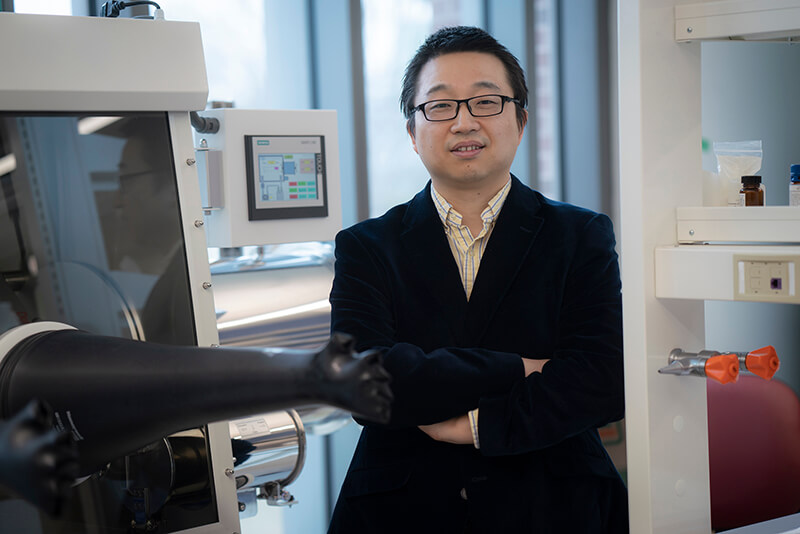September 2, 2020
Purdue 2-dimensional nanomaterial shows promise for high-speed electronics, quantum devices and defense tools

Wenzhuo Wu, Purdue’s Ravi and Eleanor Talwar Rising Star Assistant Professor of Industrial Engineering, is working to take a new two-dimensional nanomaterial to market. (Image provided)
WEST LAFAYETTE, Ind. – Purdue University researchers have passed another significant milestone as they work to take a new two-dimensional nanomaterial to market for use in nanoelectronics, quantum devices and infrared technology used in national defense tools and biochemical sensors.
The Purdue team received a U.S. patent for the nanomaterial, derived from the rare element tellurium, which has a thin, durable structure with unique properties.
“Purdue is the birthplace of this new material,” said Wenzhuo Wu, Purdue’s Ravi and Eleanor Talwar Rising Star Assistant Professor of Industrial Engineering, who led the team. “Our technology produces atomically thin 2D tellurium, which can be used for high-performance devices. The amount needed for each device is very little, and the added values can be enormous.”
Tellurium is not abundant on the Earth’s crust, but Wu said only a tiny amount is needed to be synthesized through their solution method. Wu said the Purdue nanomaterial, called tellurene, is air-stable and can grow on its own without the help of another substance.
“Recent advances have led to new electronic and photonic device paradigms leveraging 2D materials, which have an atomically thin thickness, but their length and width are much larger than that thickness,” Wu said. “Our solution helps overcome roadblocks for known 2D materials to meet the technological needs in emerging areas such as nanoelectronics or mid-infrared integrated photonics.”
Tellurene has several potential applications, including high-speed electronics, wearable sensors, quantum devices and infrared technology.
Wu said he and the students discovered their solution by accident while they were conducting routine experiments in the laboratory. Since their discovery of tellurene, Wu and his team have published over a dozen papers on the intriguing properties and device applications of tellurene for nanoelectronics, infrared sensors, photonic devices and other technologies.
The team worked with the Purdue Research Foundation Office of Technology Commercialization to patent the technology. For more information on licensing, commercialization and other opportunities, contact Matt Halladay from OTC at mrhalladay@prf.org.
About Purdue Research Foundation Office of Technology Commercialization
The Purdue Research Foundation Office of Technology Commercialization operates one of the most comprehensive technology transfer programs among leading research universities in the U.S. Services provided by this office support the economic development initiatives of Purdue University and benefit the university's academic activities through commercializing, licensing and protecting Purdue intellectual property. The office recently moved into the Convergence Center for Innovation and Collaboration in Discovery Park District, adjacent to the Purdue campus. In fiscal year 2020, the office reported 148 deals finalized with 225 technologies signed, 408 disclosures received and 180 issued U.S. patents. The office is managed by the Purdue Research Foundation, which received the 2019 Innovation and Economic Prosperity Universities Award for Place from the Association of Public and Land-grant Universities. In 2020, IPWatchdog Institute ranked Purdue third nationally in startup creation and in the top 20 for patents. The Purdue Research Foundation is a private, nonprofit foundation created to advance the mission of Purdue University. Contact otcip@prf.org for more information.
About Purdue University
Purdue University is a top public research institution developing practical solutions to today’s toughest challenges. Ranked the No. 6 Most Innovative University in the United States by U.S. News & World Report, Purdue delivers world-changing research and out-of-this-world discovery. Committed to hands-on and online, real-world learning, Purdue offers a transformative education to all. Committed to affordability and accessibility, Purdue has frozen tuition and most fees at 2012-13 levels, enabling more students than ever to graduate debt-free. See how Purdue never stops in the persistent pursuit of the next giant leap at purdue.edu.
Writer: Chris Adam, cladam@prf.org
Source: Wenzhuo Wu, wu966@purdue.edu

